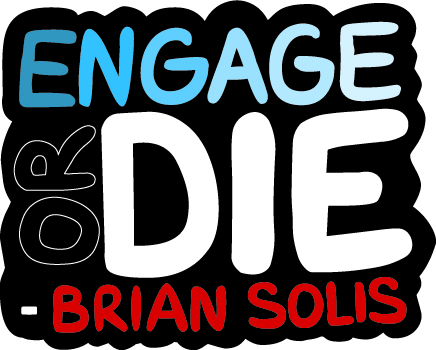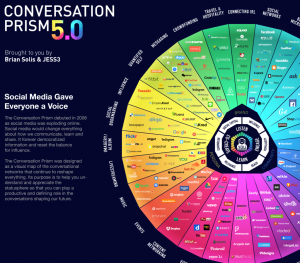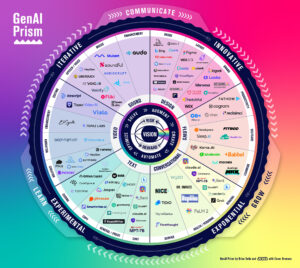I recently hosted a discussion on the need to lessen, not eliminate, the emphasis we place on the social media case studies and “how to” posts that are now universal, as they won’t apply to the specific circumstances or context of our challenges, opportunities, and market dynamics. I believe that we should use them solely for inspiration, but not as templates for our work. The best advice that I or anyone for that matter, can offer, lies in our ability to help you define the questions you must ask and answer yourself.
Why?
This is our time to become the very experts in our space that we once sought to answer our own questions. As such, our work should focus on self-empowerment, placing the responsibility of leadership and direction directly on us.
It’s why I wrote Engage! and also, why I am now introducing EngagingBook.com – a resource that shares the insights that didn’t make the final cut as well as new chapters that continue the education.
This is an investment in “you” and your role in leading the revolution from within. The key to success is context. And I wrote Engage to help you…
1. Redefine what you know and don’t know about social media to reset the foundation for learning and advancement (specific to your world)
2. Determine where to start, focus, grow, and to what extent
3. Collect and package information to win support for pilot programs and campaigns
4. Determine the amount of resources to support programs
5. Identify influential voices within social networks
6. Engage in meaningful and useful ways that deliver value and build both relations and relationships
7. Establish a conversational workflow to scale social media across departments
8. Build communities and inspire advocacy
9. Define useful metrics and measure everything from KPIs to ROI
10. Learn, adapt, and lead…
And that’s just the beginning.
#EngageorDie






And well written it was! Thanks Brian for all you contribute to our Social Media For Business community. Cheers
Thank you!
The weight we place on social media studies or howto's in general may be exactly because they are so profuse. They're so profuse because there are thousands of people teaching themselves the same thing.
“This is our time to become the very experts in our space that we once sought to answer our own questions”
Bravo.
Brian. This is crazy. I just picked up our copy of engage, and in it you constantly reference what other companies have done with Social Media. You tell stories from BA, Mercedes, Zappos and more. More so, you write prescriptively, instructing people on exactly what you say they should do with different tools. I don't get this approach. Am I missing this, or did I read correctly when someone quoted you on stage saying “we dont need case studies”?
If you go back to our conversations from 4+ years ago and in the time since, you may recall the emphasis I place on the fact that everything is situational – that we must put it all in context and understand the different variables unique to each situation. While we can not really duplicate the exact steps of another in every case, we can, indeed we must, adapt the lessons learned for our particular need. Indeed, this line of thinking you promote above is very much inline with what I have been telling companies (and you) for many years. But to do so in a way that says throw out case studies is not correct and ill advised, especially given the obvious hypocrisy in the statement when you are out sharing those stories and case studies so often as part of your professional speaking life.
I love you man, but I gotta disagree with your approach here…
That said, I also love the fact that you reinterpreted my well known mantra in that other post. As you know very well, I have long said “There is no box” (which was inspired by the kids in The Matrix saying there is no spoon and all those people saying 'think outside the box'). So your more exact explanation here is heart warming Brian: “Sometimes it’s easier to think outside the box, when there isn’t a box to begin with…”
Chris, you know, I always speak highly of you and your wisdom. To say, “we don't need case studies” is a bit extreme. To place them front and center as the source of our education and experimentation is ill advised and more accurate to the point I was making. In fact, your idea of “there is no box” is at the source of the passion shared in the post…as in my comment to Cathy, we might be saying the same thing. I also added a mention to you in the older post…I believe people should “hear” your passion when you speak about it because it's the message that needs to reverberate.
thank you Brian. given how many sources we all have each day I know how hard it is to attribute everything appropriately, but that is the reason why I strive so hard to credit others, even when I cant remember exactly where I got it from… its key to the “link economy” as Jeff Jarvis would say
It seems to me that case studies, while inherently flawed in social media cases since no two cases are alike and no two campaigns even for the same company can be done with a cookie cutter, are critical. Yes, we've made great progress and the use of social media is certainly far more pervasive than it was even 6 months ago, but we are still VERY early days here … So not sure that I fully buy the logic … That said, if the point is that case studies shouldn't be held as gospel but instead as signposts perhaps I actually *do* agree?
Hi Cathy, it is indeed the essence of my focus. Although, I suppose it's easy to misinterpret. I am not saying we don't need case studies, only that we need to focus on writing our own. Use them for inspiration, but not as a template…
I had a feeling that's what you meant. To be frank, I think saying we don't need case studies at all is silly. However, leveraging them as a sole resource and holding up case studies as the end all be all way of doing things is no better. As with all things, it's about the reality space that lies in between. Learn from past experiences, see patterns and then approach every situation with fresh eyes and new ideas.
that's essentially what I was saying and believe as well
the problem Brian is that whether it was an accidental misstatement during your speech, or a misinterpretation by others, it was clear that people are out saying that you said we dont need case studies and we shouldnt do them… that is clearly not the case
the point is not to rely on case studies as a perfect blueprint for what you should do – indeed, if you replicate what someone else does, you may well exact the exact opposite results
there are some cases for instance in PR where you dont want to give a story any oxygen, and other cases where clearly you need to address the story head on…
Hi Cathy, it is indeed the essence of my focus. Although, I suppose it's easy to misinterpret. I am not saying we don't need case studies, only that we need to focus on writing our own. Use them for inspiration, but not as a template…
If the message here is to stop looking for a template for your own business success, I couldn’t agree more. I find some clients are hesitant to try things because they want data that shows “it works” – whatever that means. Or they’re afraid of making mistakes. They’re looking for assurance to justify expenses. And case studies can help them get over those hurdles.
While I can understand that, I don’t ever discuss case studies with clients because there are too many variables. For example, the tools change everyday. I wouldn’t point to a year-old FB case when some of the functionality is fundamentally different.
Likewise, it would be impossible to duplicate a successful campaign because there are so many moving pieces and so much of it runs on people. Success could boil down to having a community manager who was born to make friends vs. a community manager who got drafted for the job because she knows how the technology works.
I do think case studies are helpful in teaching social media marketing. The people in my class are newbies and often don’t even use the tools yet. They need a crash course in what’s possible.
But clients? Not so much. They need to become leaders and define what’s possible. With my help, of course. 🙂
@CarriBugbee
Brian – I purchase your book based on a friend's recommendation. I was hook by the foreword, then as soon I got to chapter 1… I want to shoot my friend. This book isn't easy to read nor it has an easy flow. I got unengage (no pun intended)
I was thinking it would be a beginner book/how to book. But this is more like hype and smoke and mirror BUT
until I got to Chapter 17. Part IV WE ARE THE CHAMPIONS is a winner.
I wish you have a workbook to go with this book.
Overall this book is a great reference guide but not a how to guide. But it is slowwwwwwwwwwwwwly growing on me. I just need my handy dictionary nearby.
Cheers!
Brian, just picked up a copy of your book yesterday. It's rare that I go into a bookstore and purchase a copy of a book any more…but the cover on Engage, was, well…engaging.
I've read the first 1/3rd of the book already…and so far I'm very impressed. I also enjoy the “deleted scenes” and extra content here on the web that you've pointed out in this post.
Fantastic thus far Brian.
Wow, Joseph, thank you for taking the time to get the book and also comment here. Cheers!